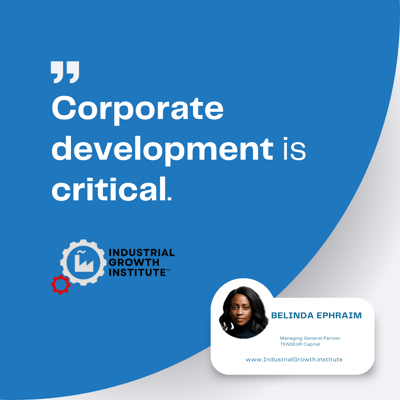Middle Market Industrial Manufacturers May Overlook Important Inorganic Growth Plays

Belinda Ephraim grew up in a Nigeria that still harbored turmoil from the Biafran civil war. In fact her family fled violence, settling in South Florida. But Belinda didn't have time to feel sorry for herself. Instead, she went to work.
Multiple jobs. Different uniforms and shifts at the Miami Marriott.
And she worked.
Eventually she earned her degree and landed an investment banking job. She parlayed that into her MBA and then her own boutique IB firm. Recently she's launched an industrial Deep Tech venture capital fund.
So Belinda's background was perfect for our conversation about how family owned industrial manufacturing firms might consider using M&A and even corporate VC as tools to boost inorganic growth.
You might think of corporate development as being the domain of only the biggest firms, but that might be a mistake. Listen in as Belinda and I discuss the ins and outs.
Connect with Belinda to follow her Deep Tech VC fund.
Check out Belinda's Tenseur Capital website |
Running a Corporate Development & Corporate VC Playbook in a Middle Market Manufacturer - Belinda Ephraim on Industrial Growth Institute Episode 62
Episode Recap
Summary

In this episode, Ed Marsh and Belinda Ephraim delve into the world of deep tech and venture capital. Belinda, managing general partner at TENSEUR Capital, shares her insights on the importance of scientific foundations in technology, the challenges of 3D printing, and the necessity of a strong work ethic for founders.
They discuss her transition from investment banking to venture capital, the significance of customer market fit, and the role of lifelong learning in achieving success. The conversation also touches on:
- Belinda's immigrant experience from Nigeria
- her journey in building a network of innovators through her podcast, the Neo Industrial Podcast
- the importance of proof of concept in investment decisions
- the need for corporate development strategies in middle-market manufacturing
- the potential of corporate venture capital to drive innovation.
Belinda also emphasizes the necessity for companies to adapt and innovate in response to market changes, particularly in the context of U.S. manufacturing and the evolving landscape of technology investments.
Middle market industrial manufacturers may overlook the inorganic growth opportunity of acquisitions and might not consider corporate venturing as a way to place affordable bets on technology.
Takeaways
- Deep Tech is rooted in scientific and engineering foundations.
- The future of technology will require new infrastructures to support advancements.
- Lifelong learning and adaptability are crucial for success in business.
- Customer pain points should drive product development in deep tech.
- Investment banking experience can provide valuable insights for venture capital.
- The importance of a strong work ethic in founders of deep tech startups.
- Disruption in industries requires a generalist mindset.
- The Neo Industrial Podcast aims to bridge gaps in knowledge and networking.
- Building a venture firm involves understanding the complexities of technology commercialization.
- Corporate VC can become misaligned with the company's vision.
Takeaway Quotes from Belinda Ephraim
- "Disruption requires a generalist mindset."
- "Corporate development is a critical factor."
Outline
00:00 Introduction to Deep Tech and Venture Capital
02:23 Understanding Deep Tech: Definition and Scope
04:29 The Future of Technology and Its Impact on Humanity
10:27 The Transition from Investment Banking to Venture Capital
11:43 The Importance of Lifelong Learning and Adaptability
15:51 Building a Venture Firm: TENSEUR Capital
18:19 The Work Ethic of Founders in Deep Tech
20:50 Customer Market Fit vs. Product Market Fit
24:30 Navigating the Journey of an Immigrant Entrepreneur
33:04 The Path to Investment Banking and Entrepreneurship
40:54 The Purpose of the Neo Industrial Podcast
42:24 Proof of Concept: The Foundation of Investment
50:54 Navigating Corporate Development and Growth Strategies
01:01:25 The Role of Corporate Venture Capital
01:10:48 The Future of U.S. Manufacturing and Investment Opportunities
Inorganic Growth Should Complement Organic
Many mid-size industrial manufacturers may sell themselves short. They may have more inorganic growth opportunity than they realize. But owners and the board have to incorporate those discussions into strategy conversations, and set expectations for management.
In many cases there's also an unfulfilled organic growth opportunity. That's the premise of ORE™ (Overall Revenue Effectiveness Framework) that helps manufacturers visualize their revenue growth system as a production line.

